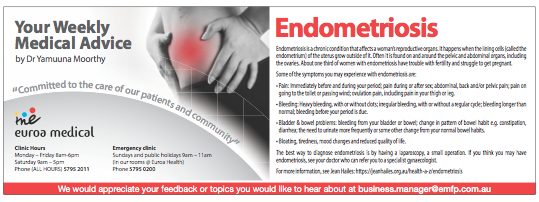
Endometriosis is a chronic condition that affect a woman’s reproductive organs. It happens when the lining cells (called the endometrium) of the uterus grow outside of it. Often it is found on and around the pelvic and abdominal organs, including the ovaries. About one third of women with endometriosis have trouble with fertility and struggle to get pregnant.
Some of the symptoms you may experience with endometriosis are:
- Pain: Immediately before and during your period; pain during or after sex; abdominal, back and/or pelvic pain; pain on
going to the toilet or passing wind; ovulation pain, including pain in your thigh or leg. - Bleeding: Heavy bleeding, with or without clots; irregular bleeding, with or without a regular cycle; bleeding longer than
normal; bleeding before your period is due. - Bladder & bowel problems: bleeding from your bladder or bowel; change in the pattern of bowel habit e.g. constipation, diarrhoea; the need to urinate more frequently or some other change from your normal bowel habits.
- Bloating, tiredness, mood changes and reduced quality of life.
The best way to diagnose endometriosis is by having a laparoscopy, a small operation. If you think you may have
endometriosis, see your doctor who can refer you to a specialist gynaecologist.
For more information, see Jean Hailes: https://jeanhailes.org.au/health-a-z/endometriosis
Written by Dr Yamuna Moorthy

